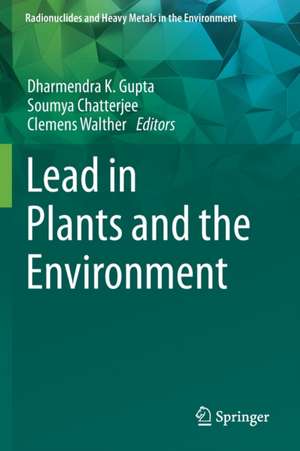Lead in Plants and the Environment: Radionuclides and Heavy Metals in the Environment
Editat de Dharmendra K. Gupta, Soumya Chatterjee, Clemens Waltheren Limba Engleză Paperback – 6 noi 2020
Lead in Plants and the Environment reports on methods for detecting, measuring, and assessing the concentration of lead in plants. The authors provide a method for the measurement of 210Pb isotopes in plants. This method can be applied extensively in different environmental settings, not only as a way of revealing sources of lead, but also as a way to monitor lead transport in plants and animals that ingest them.
The chapters include coverage on the following topics:
· Lead bioavailability in the environment and its exposure and effects
· Radioanalytical methods for detecting and identifying trace concentrations of lead in the environment
· Lead contamination and its dynamics in soil plant systems
· Lead pollution monitoring and remediation through terrestrial plants in mesocosm constructed wetlands
· A review of phytoremediation of lead
This book is a valuable resource to students, academics, researchers, and environmental professionals doing field work on lead contamination throughout the world.
| Toate formatele și edițiile | Preț | Express |
|---|---|---|
| Paperback (1) | 636.63 lei 6-8 săpt. | |
| Springer International Publishing – 6 noi 2020 | 636.63 lei 6-8 săpt. | |
| Hardback (1) | 642.83 lei 6-8 săpt. | |
| Springer International Publishing – 6 noi 2019 | 642.83 lei 6-8 săpt. |
Preț: 636.63 lei
Preț vechi: 748.97 lei
-15% Nou
Puncte Express: 955
Preț estimativ în valută:
121.82€ • 127.19$ • 100.82£
121.82€ • 127.19$ • 100.82£
Carte tipărită la comandă
Livrare economică 04-18 aprilie
Preluare comenzi: 021 569.72.76
Specificații
ISBN-13: 9783030216405
ISBN-10: 3030216403
Pagini: 207
Ilustrații: IX, 207 p. 40 illus., 38 illus. in color.
Dimensiuni: 155 x 235 mm
Greutate: 0.31 kg
Ediția:1st ed. 2020
Editura: Springer International Publishing
Colecția Springer
Seria Radionuclides and Heavy Metals in the Environment
Locul publicării:Cham, Switzerland
ISBN-10: 3030216403
Pagini: 207
Ilustrații: IX, 207 p. 40 illus., 38 illus. in color.
Dimensiuni: 155 x 235 mm
Greutate: 0.31 kg
Ediția:1st ed. 2020
Editura: Springer International Publishing
Colecția Springer
Seria Radionuclides and Heavy Metals in the Environment
Locul publicării:Cham, Switzerland
Cuprins
Chapter1: Main analytical methods for determining lead in environmental and biological samples.- Chapter2: Environmental distribution and modelling of radioactive lead (210): A Monte Carlo simulation application.- Chapter3: Lead pollution and human exposure: Forewarned is forearmed, and the question now becomes how to respond to the threat!.- Chapter4: Impact of lead contamination on agro-ecosystem and human health.- Chapter5: Lead contamination and its dynamics in soil plant system.- Chapter6: Lead toxicity in plants: A review.- Chapter7: The mechanisms involved in photosynthetic apparatus protection against lead toxicity.- Chapter8: Physiological and biochemical changes in plant growth and different plant enzymes in response to lead stress.- Chapter9: Biological strategies of lichen symbionts to the toxicity of lead (Pb).- Chapter10: Phytoremediation of lead: A review.
Textul de pe ultima copertă
This book examines the way that lead enters the biosphere and the subsequent environmental impact. The contributing authors include international experts who provide methods for assessing and characterizing the ecological risk of lead contamination of soil and plants. Information is provided on the consequences for human health as a result of lead pollution. This book reveals that approximately 98% of stable lead in the atmosphere originates from human activities.
Lead in Plants and the Environment reports on methods for detecting, measuring, and assessing the concentration of lead in plants. The authors provide a method for the measurement of 210Pb isotopes in plants. This method can be applied extensively in different environmental settings, not only as a way of revealing sources of lead, but also as a way to monitor lead transport in plants and animals that ingest them.
The chapters include coverage on the following topics:
· Lead bioavailability in the environment and its exposure and effects
· Radioanalytical methods for detecting and identifying trace concentrations of lead in the environment
· Lead contamination and its dynamics in soil plant systems
· Lead pollution monitoring and remediation through terrestrial plants in mesocosm constructed wetlands
· A review of phytoremediation of lead
This book is a valuable resource to students, academics, researchers, and environmental professionals doing field work on lead contamination throughout the world.
Lead in Plants and the Environment reports on methods for detecting, measuring, and assessing the concentration of lead in plants. The authors provide a method for the measurement of 210Pb isotopes in plants. This method can be applied extensively in different environmental settings, not only as a way of revealing sources of lead, but also as a way to monitor lead transport in plants and animals that ingest them.
The chapters include coverage on the following topics:
· Lead bioavailability in the environment and its exposure and effects
· Radioanalytical methods for detecting and identifying trace concentrations of lead in the environment
· Lead contamination and its dynamics in soil plant systems
· Lead pollution monitoring and remediation through terrestrial plants in mesocosm constructed wetlands
· A review of phytoremediation of lead
This book is a valuable resource to students, academics, researchers, and environmental professionals doing field work on lead contamination throughout the world.
Caracteristici
Educates researchers and academicians who are working on lead contamination and remediation practices Describes isotopic as well as stable forms of lead, and its impact on plants and the environment Benefits graduate and undergraduate students specializing in radioecology and environmental sciences


